An investigation broadcast Friday into Israel’s failure to contain the coronavirus pandemic blamed the lack of an effective contact tracing program to cut infection chains.
Israel swiftly responded to the novel coronavirus when it first emerged in the spring, and limited its spread through lockdown measures and restrictions on international travel, but likely reopened too quickly, leading to a severe second wave outbreak. Israel now has one of the highest per capita infection rates in the world.
Most experts believe that effective contact tracing, combined with isolation of infected and exposed people, is key to stopping the spread of the coronavirus.
The Channel 12 report, broadcast on Friday, highlighted the tracing system’s failures, including that people who needed to enter quarantine were not informed, and the Shin Bet’s surveillance system repeatedly made mistakes.
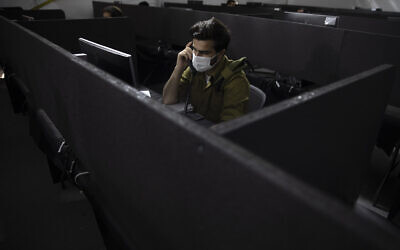
An Israeli soldier interviews a person infected with coronavirus to identify who the person has been in contact with, at the headquarters of the Home Front Command, in Ramle, Central Israel, Aug. 25, 2020 (AP Photo/Sebastian Scheiner)
It wasn’t until the second wave outbreak in Israel was in full swing, in mid-August, that the military, with its manpower and know-how, was tasked with devising and operating a system to cut infection chains.
The decision likely came too late, as the virus outbreak was already out of control, the report said. The military-run program will only be fully operational by November, Israel’s virus czar Ronnie Gamzu has said,
According to the TV report, even when the Home Front Command’s system is in place and working at full capacity, it will be able to trace the contacts of fewer than half of all new infections in an outbreak this size.
Building the system required extensive training for tracers, and setting up infrastructure, but, “This is not simply a process of training,” said Col. Reli Margalit, the head of the Home Front Command’s tracing outfit. “These are massive amounts of [infected] people.”

New confirmed cases of Covid-19 in European Union, United States, Brazil, United Kingdom and Israel: Seven-day rolling average of new cases, per million, September 24, 2020 (Financial Times screenshot)
A single epidemiological tracing interview takes, at a minimum, 30 to 40 minutes, said Omimah Cnaani, an epidemiological nurse who is helping train Israel Defense Forces soldiers.
In the past week, there were some 1,400 active contact tracers, and in another month, there will be 2,000, but investigators will likely be contending with twice that number of infections, per day.
Besides the interviews, the tracers must find and communicate all of the infected persons’ contacts to order them into isolation.
Even at maximum efficacy, the contact tracing program will be inadequate, the Channel 12 report said, blaming the Health Ministry for neglecting the system for six months and not cutting infection chains when the low numbers made it still possible.
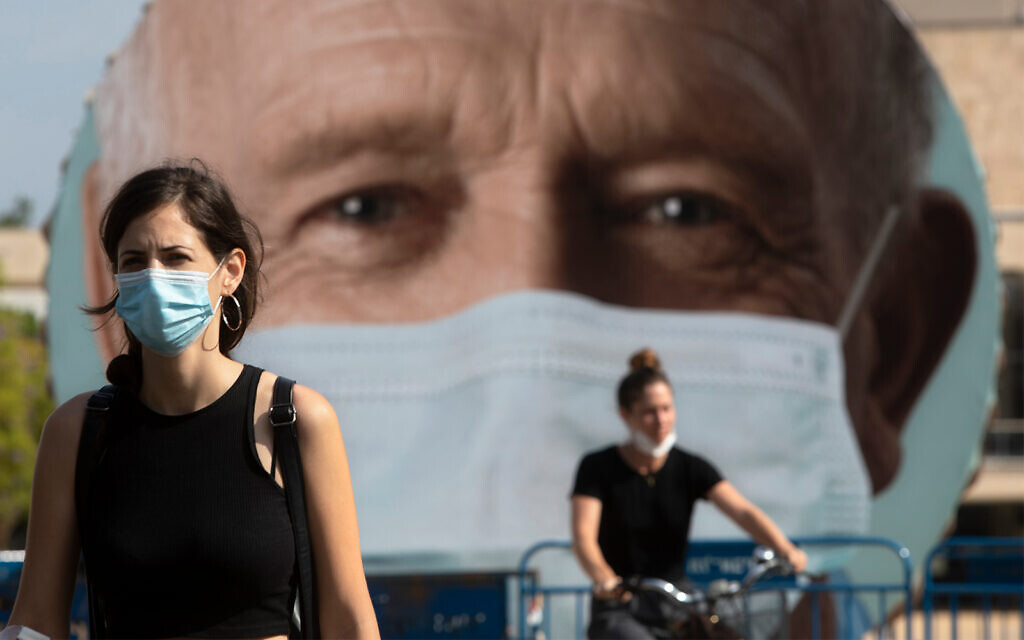
A woman walks past a banner encouraging people to wear face masks in Tel Aviv, Sept. 24, 2020. (AP Photo/Sebastian Scheiner)
The number of infections is overwhelming, and the huge number of people forced into quarantine following contact with infected people, is crushing the country, the report said. For example, if there are 7,000 daily new infections, and each infected person came into contact with 10 people, there would be 2.4 million Israelis ordered into quarantine each month. Israel had around 7,000 new infections per day in the past week.
Meanwhile, the country is not carrying out enough tests, or returning test results to people quickly enough, the report noted. For example, if someone is tested, and receives a positive result three days later, it is only after those three days that the epidemiological investigation begins, meaning other people they may have infected could continue spreading the disease unawares.
The report also said that technological tracing measures were a failure. A mobile app would have been the simplest and most effective solution, but Israel’s “Magen” app failed, mostly because people were suspicious of it and did not want to voluntarily download it onto their phones.
There are Bluetooth technologies that can alert users when they are near a virus carrier, without tracking their location, which would have likely been more effective and less invasive.
However, Israel decided to use Shin Bet location tracking technology instead, and the faulty program sometimes misidentified people as being near carriers, forcing them into quarantine unnecessarily.
Epidemiological investigators in Bnei Brak, a densely populated, primarily ultra-Orthodox city that was hit especially hard by the virus, told the network that they quickly understood that they needed to prioritize speed over thoroughness in contact tracing.
“If you did a very precise investigation, but it wasn’t fast, then you don’t have any relevant information. Ok, you will have more data, but it won’t help because you missed all [the infections],” said Bnei Brak epidemiological investigator Avi Cohen.
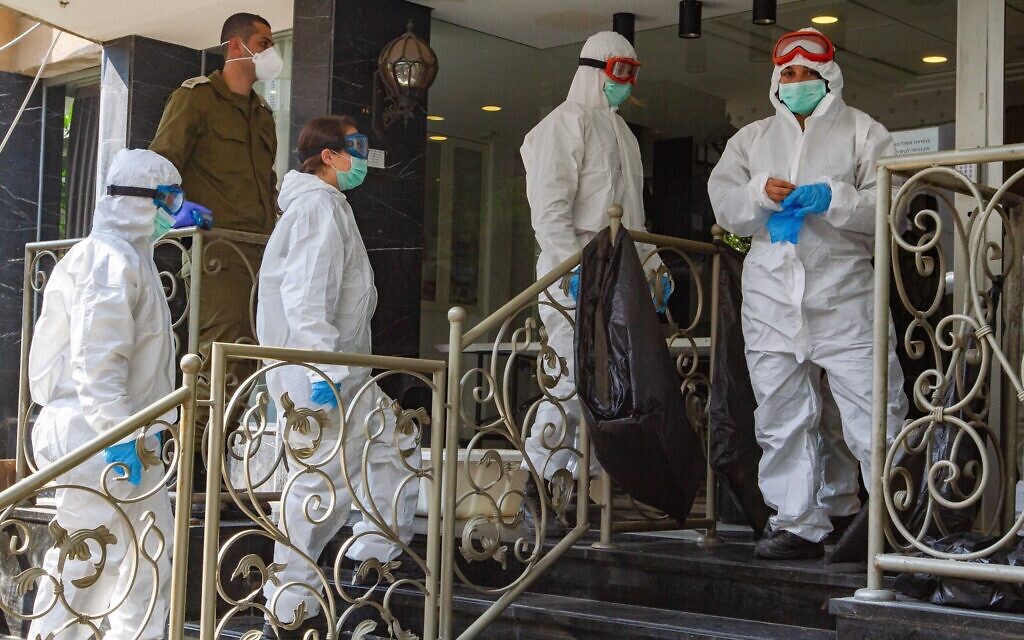
Soldiers from the Home Front Command wearing full protective clothing at a nursing home in the city of Bnei Brak, April 14, 2020. (Flash90)
Cohen also said that schools should not have been shut down, because it was easy to quickly identify local outbreaks via the students and cut chains of infection.
“There’s no problems with privacy; we know exactly where every student in the class is located. You can cut the infection chain in a minute. Message the parents, and close the case. The class goes into quarantine, and the capsules go into quarantine,” Cohen said.
Meanwhile, Channel 13 reported on Friday from the IDF’s coronavirus-fighting headquarters, called the “Alon” command.
Transferring responsibility for contact tracing over to the IDF was one of coronavirus czar Gamzu’s first moves after taking on his position in late July. In early September, Gamzu said that the program might not be operational until November 1.
The outfit, under the IDF’s Home Front Command, is based in the central city of Ramle.
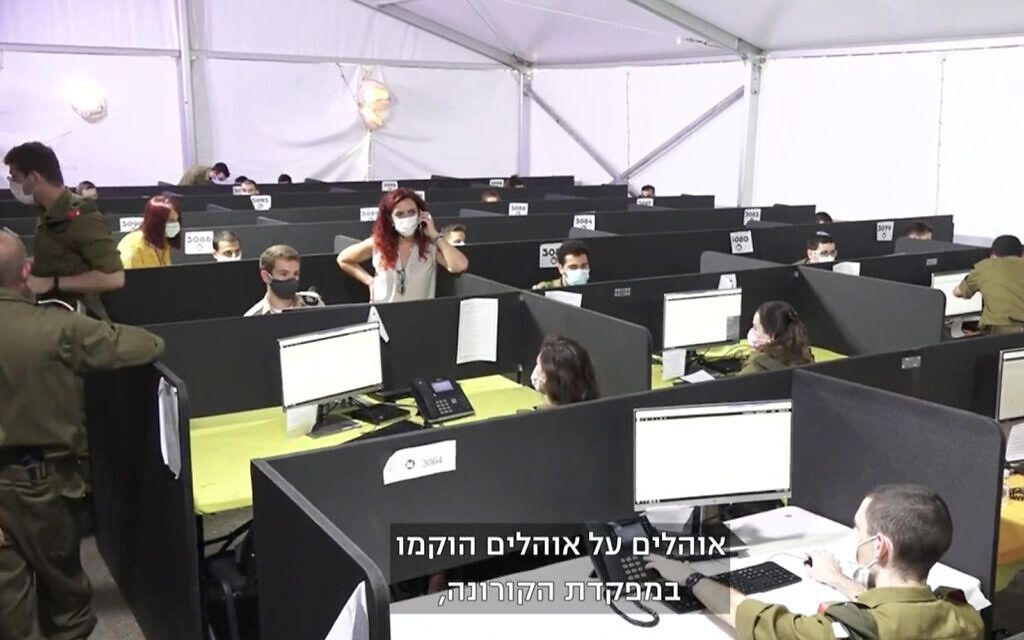
IDF contact tracers in the central city of Ramle, in a TV report released on September 25, 2020. (Screenshot/Channel 13)
Founded in the wake of Iraqi Scud missile attacks on Israel during the 1991 Gulf War, the Home Front Command serves as Israel’s civil defense force. It helps maintain the country’s network of bomb shelters and air raid sirens, and is trained to assist civilians during wars and natural disasters. It has sent rescue teams around the world to help countries coping with earthquakes, tsunamis and other emergencies.
At the start of the outbreak, the command managed a network of coronavirus hotels, providing both isolation facilities and recovery services for infected people with mild or no symptoms. Its soldiers have also distributed food and supplies in hard-hit areas — including communities that have had little contact with the military, such as Arab towns and ultra-Orthodox Jewish neighborhoods.
Thousands of Home Front Command soldiers were deployed last week throughout the country to work with local authorities in handling the pandemic. The soldiers are not responsible for directly enforcing the lockdown; rather, they conduct tests, run quarantine hotels and distribute food.
The military staffers at the Ramle headquarters are working with government health providers and other officials and medical professionals to tackle the second wave virus outbreak.
“You see all the groups here who are players in dealing with the country’s coronavirus. We are now just building up our capabilities and going out to the field to take action, and the scale is going to increase,” said Brig. Gen. Nissan Davidi, who is commanding the unit.
The outfit is operating out of a number of tents, where soldiers receive training and carry out tracing.
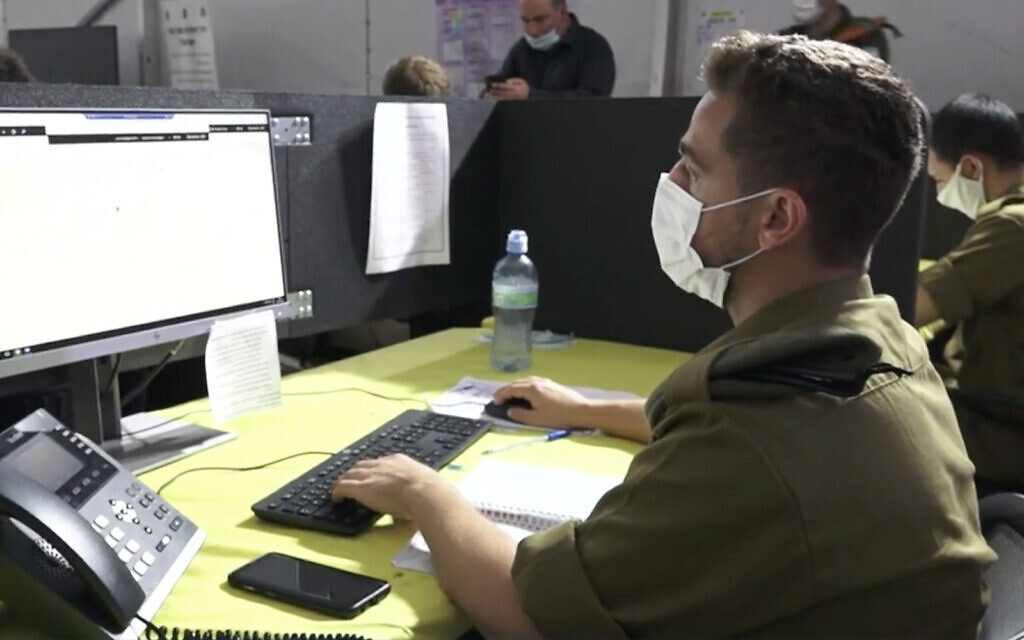
IDF contact tracers in the central city of Ramle, in a TV report released on September 25, 2020. (Screenshot/Channel 13)
In simple terms, the troops receive information on newly infected virus carriers, who then provide lists of people they have recently met. The tracers then map out the carriers’ movements and meetings with others and determine who should be put into quarantine.
The system was built gradually, and still moves slowly. Currently, it takes around 90 hours for the soldiers to contact everyone who came in contact with an infected person. The goal is to reach everyone within 24 to 36 hours, which will likely be possible only after the new lockdown, the report said.
Additionally, Defense Minister Benny Gantz on Monday ordered the IDF to prepare to establish a field hospital for coronavirus cases as hospitals overflow across the country.
The Health Ministry on Friday updated the number of new coronavirus cases recorded the previous day to a whopping 8,178, far surpassing the previous high, hours after stricter lockdown measures went into effect.
The ministry also reported 11 more deaths at midnight, raising the national toll to 1,412.
Meanwhile, a sweeping new lockdown took force at 2 p.m. on Friday, though lawmakers were unable to reach an agreement over possible restrictions on protests and public prayers.

Police patrol outside the Mahane Yehuda Market in Jerusalem on September 25, 2020 (Yonatan Sindel/Flash90)
Under the new rules, nearly all businesses are closed, with the exception of specific companies and factories designated as “essential” by the Defense Ministry’s National Emergency Authority. Restaurants are permitted to operate on a home-delivery basis only.
Israelis won’t be allowed to travel more than a kilometer (0.6 miles) from their homes, with the exception of specific activities that are exempted.
Police will be deployed on highways and at the entrances to cities and towns to ensure Israelis don’t attempt to travel during the lockdown.
"severe" - Google News
September 26, 2020 at 07:33PM
https://ift.tt/333TcZP
Contact tracing failure to blame for severe 2nd wave outbreak – Israel TV report - The Times of Israel
"severe" - Google News
https://ift.tt/2OrY17E
Shoes Man Tutorial
Pos News Update
Meme Update
Korean Entertainment News
Japan News Update
Bagikan Berita Ini















0 Response to "Contact tracing failure to blame for severe 2nd wave outbreak – Israel TV report - The Times of Israel"
Post a Comment